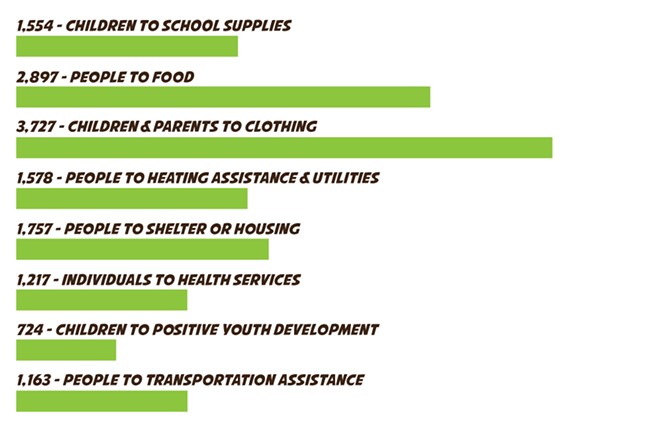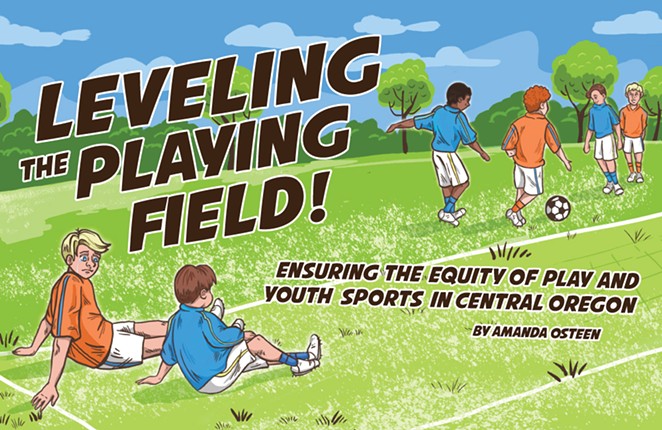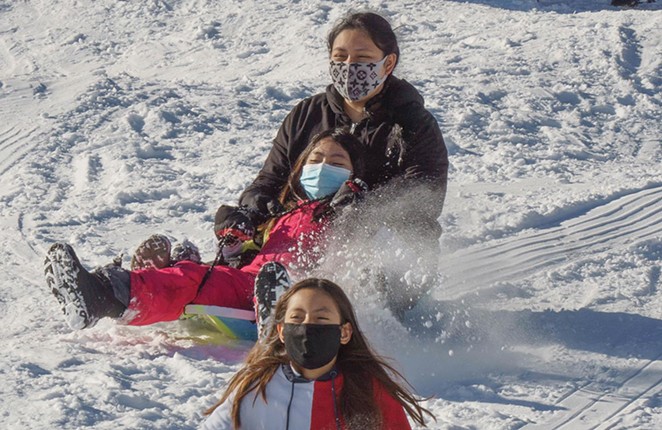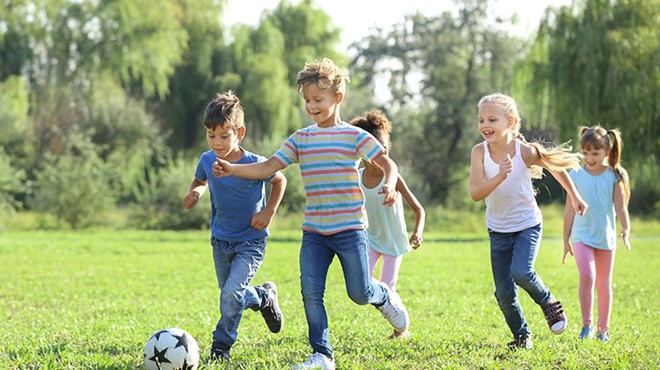Central Oregon is the ultimate playground for kids — if their parents can afford it, that is. With recent increases in the cost of living and expenses, parents may feel more pressured than ever to say "no" to their kids on expensive sports and activities. Is every kid in our community getting a fair shot at playing and having fun? After all, they may be the next Olympian, NFL player, endurance athlete or simply the next well-rounded person who leaves no trace on the trail.
Play is incredibly valuable. Playing with others on a team or outside can create memories and inspire values that last a lifetime. The children's occupational therapy clinic, Kid's Play, outlines that skills built upon during "free" or unstructured play include planning, higher order reasoning, body awareness, problem solving, emotional self-regulation and social skills. In the article, Exposure to Neighborhood Green Space and Mental Health, the author points out how activities in green space (such as hiking, biking, skiing, paddling and even just taking in the scenery) all have positive effects on the brain in terms of reducing mental fatigue and stress. Being left out of play as a child may prevent someone from building the habits of play and physicality over the course of a lifetime. Numerous barriers of entry exist in order to play sports in Central Oregon – though resources do exist to overcome those barriers.
Humans are made to play for life. However, there are some clear barriers to entry for income and language-restricted members of the Central Oregon community.
Reducing the costs of sport for families
The easiest way for kids to access organized sports is through schools. This brings us to our first barrier: the pay to play fee. Athletic Director of Bend's Caldera High School, Dave Williams, explains that "the fee is $100 per sport for high schoolers and $40 per sport for middle school athletes. If you receive free or reduced lunch, scholarships are available through the Education Foundation [for Bend-La Pine Schools] that reduce the pay to play fee to $25 per sport. This scholarship is confidential."
Williams also points out that "after a family with multiple children reaches $300 on pay to play fees, the fees are then waived on all additional sports per household despite income level." For those students who need new cleats, running shoes, a helmet, transportation assistance or something else that is restricting the child from participating in a sport, a student's local advocate in the Family Access Network may be able to help fill the gap.
While scholarships are available, not everyone can or wants to apply. For these reasons, another confidential way of paying for activities fees is through Every Kid Sports.

"If your child is enrolled in SNAP, Medicaid or WIC benefits, you can apply for the Every Kid Sports Pass. This is a debit card we issue to families for pay to play fees," explains Bryce Elliot, Community Development Manager for EKS. The card also covers some recreational sports outside the school system, as long as the program lasts at least four weeks, giving kids the chance to pursue martial arts and other activities. The sport also needs to be recreational and not an elite or travel team.
"The EKS Pass covers three fees per year per kid," Elliot said. EKS is a national nonprofit based out of Bend that is trying to build more awareness and support in Central Oregon. EKS has existed 13 years as a nonprofit [and has assisted] 100,000 kids to date, Elliot said, recalling that "last year EKS funded 35,000 kids on their pay to play fees. EKS's goal is to support 100,000 kids a year. [Over the last EKS Pass application cycle] over 30,000 applications were not able to be funded," making the need for assistance on the pay to play fee very clear.
The barriers in club sports
Club sports and overspecialization were major issues discussed during the Jan. 19 City Club of Central Oregon luncheon titled, "Challenges in Youth Sports: Local Hurdles."
Martha (whose name was changed for privacy) is a Hispanic single mother who has needed assistance with the pay to play fee. She supports two teens in addition to working full time. Martha is employed by Bend-La Pine Schools, where she learned about the reduced pay to play scholarship, bringing the cost to $25 per sport. Family Access Network supplied her son with shoes and gear. And while those opportunities have allowed her kids to play sports, Martha had to tell her daughter "no" to club volleyball. It was "too much money...$1,000 plus travel, hotels and food," she said.
Club sports are another concern for families with limited incomes. When a family cannot afford a club sport, their child can fall behind their peers in skill sets and conditioning, making them more likely to be cut from a high school team during tryouts.
To help curb the major advantage of club sports, Athletic Director Williams of Caldera High pointed out that, "the OSAA has allowed coaches to run out-of-season workouts," to help support kids who cannot join club sports.
The Aspen Institute, a nonprofit aiming to realize a "free, just and equitable society" through relevant research on various topics, provides an annual State of Play report through its Project Play initiative. The 2022 State of Play report addresses overuse injuries, pointing out that, "torn knee ligaments, hand/wrist fractures and leg/foot fractures were almost twice as likely in the U.S. than Canada." The report highlights that children limited to a single sport and specialized range of motion for too long increases the risk of overuse, as well as keeping critical muscles from developing.
The State of Play report also showed surveys depicting how overspecialization in a sport leads to mental burnout in kids. This is why Norway adopted a children's sports bill of rights in 1987. In 2022, that sparsely populated country dominated the Winter Olympics. In Norway, kids focus more on playing in a wide array of activities, then start playing competitive sports later in high school. The country's philosophy is to place more value on having fun and developing physically well-rounded athletes, rather than winning competitions.
Playing in the outdoors
Speaking of fun, there is plenty of it to be had for kids outside of organized sports. Central Oregon offers endless opportunities to find fun and recreation in the outdoors – though skiing, snowboarding, rock climbing and even hiking can be extremely expensive for families and difficult to navigate for Spanish speakers.
This introduces a third barrier: a combination of high costs of entry and lack of information, trail signs and local area maps in a language families can read.
"Going up to the mountain is not an equitable sport for a lot of people in Bend," BLPS parent Martha, whose family speaks both Spanish and English at home, explains. "If it wasn't for Vámonos Outside, my kids would not be going up there." Vámonos Outside is a local nonprofit that aims to get kids and families who identify as Black, Indigenous and/or People of Color outside, having fun and harnessing outdoor stewardship.
Last season, Wesley Heredia, Vámonos Outside programs coordinator, assisted in getting 12 kids proper ski and snowboard gear as well as season passes to Mt. Bachelor. This season, eight kids returned to the program. "The hard work felt worth it," he said, when he watched everyone riding on their own. He said he could, "relax and watch how the program was a success."
Martha praises Vámonos Outside for "helping [her kids] get out of the house, off of electronics and in nature...they come home a lot less stressed." Going to the mountain helps her kids, "plan and communicate with friends; they learn responsibility and time management," she said. Vámonos Outside also organizes group hiking and camping events for BIPOC members of the community, helping non-native English speakers get comfortable navigating trail signs and etiquette. The group also offers discounted entry for BIPOC climbing nights at The Circuit. The Every Kid Sports pass can apply to outdoor programs within Vámonos Outside for kids 4 to 18.
Bend Park and Recreation District is another fun and affordable way to get kids playing, offering scholarship applications for activities. At the recent City Club's "Challenges in Youth Sports: Local Hurdles" luncheon, panelists, Summit track coach Dave Turnbull and Bend Parks and Rec Sports Coordinator Rich Ekman agreed that there's a need for more collaboration on facility use access. Current heavy use of school gyms and fields are causing some in the community to call for more access to community facilities and green space.
Marcus LeGrand, who is Central Oregon Community College's Afro-Centric Program Coordinator in addition to being on the BLPS Board of Directors (along with other speakers in the panel) highlighted the shortage of referees and sports volunteers. For those who have ever thought about becoming a referee, now appears to be an ideal time – not just to help ref games, but to help manage the conduct of some parents at sporting events. LeGrand called attention to the fact that parent "behavior is a key reason why people are not reffing anymore."
Turnbull explained how Summit High just pulled out of the Central Oregon Basketball Organization state tournament, where it would raise $12,000 over two weekends.
"We stopped doing it because of how rude the parents are and how difficult it is. They yell and scream at our kids for running a scoreboard," he described at the luncheon. "We just said we are not doing it anymore; we are not putting kids in that situation. [Parent] behavior is a big part of what we are looking at."
LeGrand, who is also a 21-year veteran sports official, asks parents to "support your child, do not yell and scream at them, do not use profanity at them...they are at a developmental stage in life, they need support...I would love to continue to see [parents and athletes] thanking the officials and people there doing the work."
As the people at the forum described, parents sometimes have a hard time remembering that kids are playing for fun and not for titles in the NBA Finals or FIFA World Cup.
Turnbull described how he and other staff, "cleared the gym at Summit High School of all the parents [during] a middle school [basketball] championship. The parents were so rude we stopped the game. Parents had to go out in the courtyard. The kids continued playing. It became too much about them. Someone took offense when a player bumped into their kid. It's basketball, it's physical and in fifth grade, they don't control their bodies very well, there are going to be a lot of fouls."
Achieving equity in play in Central Oregon is a complex issue. People interested in supporting youth in sport in the community can volunteer or donate to the organizations that are central to the equity of play in Central Oregon.










